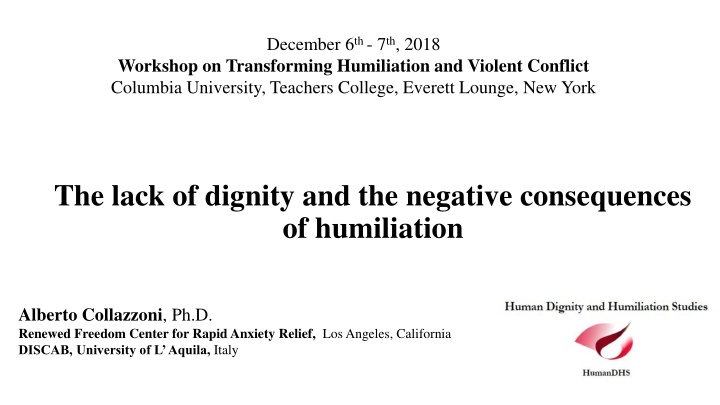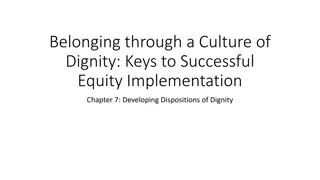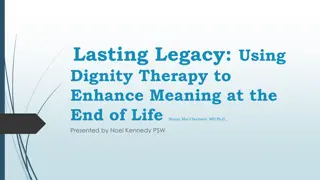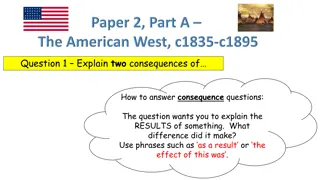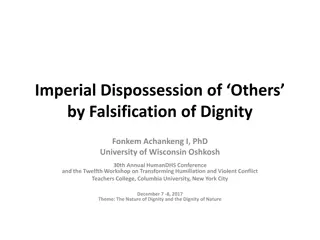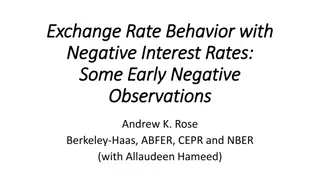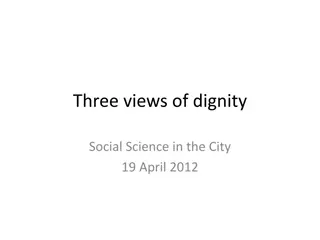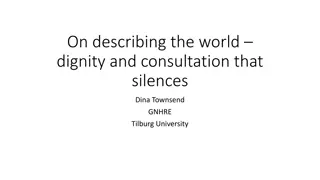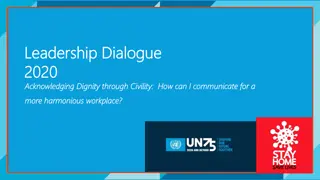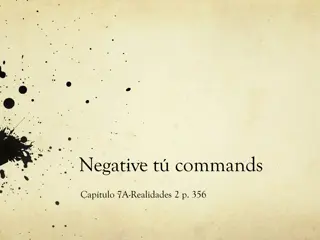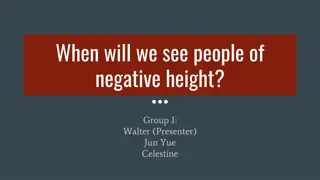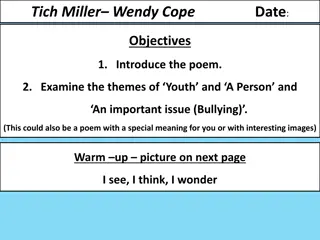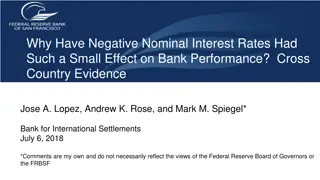The lack of dignity and the negative consequences of humiliation
Lack of dignity, consequences of humiliation, humiliation dynamics, impact on mental health, and evolutionary implications discussed at a workshop on transforming humiliation and violent conflict.
Uploaded on Mar 01, 2025 | 0 Views
Download Presentation

Please find below an Image/Link to download the presentation.
The content on the website is provided AS IS for your information and personal use only. It may not be sold, licensed, or shared on other websites without obtaining consent from the author.If you encounter any issues during the download, it is possible that the publisher has removed the file from their server.
You are allowed to download the files provided on this website for personal or commercial use, subject to the condition that they are used lawfully. All files are the property of their respective owners.
The content on the website is provided AS IS for your information and personal use only. It may not be sold, licensed, or shared on other websites without obtaining consent from the author.
E N D
Presentation Transcript
December 6th - 7th, 2018 Workshop on Transforming Humiliation and Violent Conflict Columbia University, Teachers College, Everett Lounge, New York The lack of dignity and the negative consequences of humiliation Alberto Collazzoni, Ph.D. Renewed Freedom Center for Rapid Anxiety Relief, Los Angeles, California DISCAB, University of L Aquila, Italy
Humiliation Triangle Humiliator Witness Victim Klein, D. C. (1991). The humiliation dynamic: An overview. Journal of Primary Prevention, 12 (2), 93-121. Hartling, L. M., & Luchetta, T. (1999). Humiliation: Assessing the impact of derision, degradation, and debasement. Journal of Primary Prevention, 19 (4), 259-278.
Humiliation and Depression Females and males could have a depressive episode after humiliation. Cognitive evolutionary theory explains that humiliated people could feel depressed because they lost their social rank and so they cannot control their goals and resources. Brown, G. W., Harris, T. O., & Hepworth, C. (1995). Loss, humiliation and entrapment among women developing depression: a patient and non-patient comparison. Psychological medicine, 25(1), 7-21. Collazzoni, A., Capanna, C., Bustini, M., Marucci, C., Prescenzo, S., Ragusa, M., ... & Rossi, A. (2015). A Comparison of Humiliation Measurement in a Depressive Versus Non clinical Sample: A Possible Clinical Utility. Journal of clinical psychology, 71(12), 1218-1224. Gilbert, P., Irons, C., Olsen, K., Gilbert, J., & McEwan, K. (2006). Interpersonal sensitivities: Their links to mood, anger and gender. Psychology and Psychotherapy: Theory, Research and Practice, 79(1), 37-51.
Humiliation and Persecutory Ideation Past humiliation + cold familial environment = persecutory ideation in adulthood; No physiological development of social skills; The defensive system is always activated; No trust in others = no relationships = no opportunity to disconfirm persecutory ideation. Lopes, B. C. (2013). Differences between victims of bullying and nonvictims on levels of paranoid ideation and persecutory symptoms, the presence of aggressive traits, the display of social anxiety and the recall of childhood abuse experiences in a Portuguese mixed clinical sample. Clinical psychology & psychotherapy, 20(3), 254-266. Collazzoni, A., Laloyaux, J., & Lar i, F. (2017). Examination of humiliation and past maladaptive family context in persecutory ideation: an exploratory study. Comprehensive psychiatry, 78, 19-24. Taylor, S. E., Way, B. M., Welch, W. T., Hilmert, C. J., Lehman, B. J., & Eisenberger, N. I. (2006). Early family environment, current adversity, the serotonin transporter promoter polymorphism, and depressive symptomatology. Biological psychiatry, 60(7), 671-676.
What does happen to the witness and to humiliator? Fear to be humiliated as well: flee from the humiliation dynamic. Witness Become a humiliator too. Which emotions does he/she feel? Fear? Anger? Humiliator Why? Which could be an evolutionary goal of the humiliation dynamic? Klein, D. C. (1991). The humiliation dynamic: An overview. Journal of Primary Prevention, 12(2), 93-121. Hartling, L. M., & Luchetta, T. (1999). Humiliation: Assessing the impact of derision, degradation, and debasement. Journal of Primary Prevention, 19(4), 259-278. Collazzoni, A., Capanna, C., Marucci, C., Bustini, M., Riccardi, I., Stratta, P., & Rossi, A. (2014). Humiliation: an excluded emotion. Journal of Psychopathology, 20, 252-257.
Future studies What does happen in the witness and the humiliator? Are there factors which could be considered as resilient factors against the humiliation consequences? Culture, family, social resources, personality? Do all of the humiliation dynamics lead to the same neuronal reactions, as social isolation and rejection? Eisenberger, N. I., Lieberman, M. D., & Williams, K. D. (2003). Does rejection hurt? An fMRI study of social exclusion. Science, 302(5643), 290-292.
Thank you for listening and visit Ascoli Piceno! Alberto Collazzoni +1 424 230 1200; eddycollazzoni@hotmai.it; drcollazzoni@renewedfreedomcenter.com
